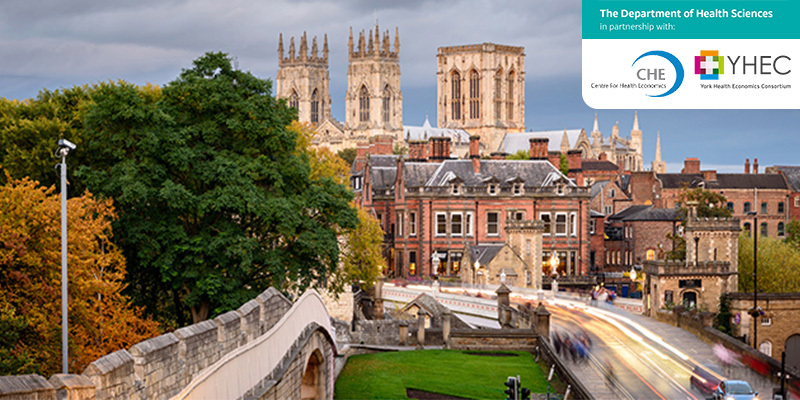
Evaluation of Medical Devices for Product Development and Health Technology Assessment
Content and learning outcomes
The course programme includes a discussion of unique characteristics of medical device evaluation and their impact on designing robust and efficient evidence generation processes, consideration of the large range of analytic methods to evaluate medical devices such as early modelling, outcome measurement (e.g. clinical, preference based, survival), epidemiological study design, costing methods, trial and model based economic evaluation.
The course is delivered by a faculty of international experts from the: Department of Health Sciences, York Health Economics Consortium and Centre for Health Economics at the University of York. They have extensive experience evaluating health technologies and contribute as committee members and / or external assessors to the Medical Technologies Evaluation Programme (MTEP) and the Technology Appraisal Programme of the National Institute for Health and Care Excellence (NICE).
In addition, there are a number of tutored practical group exercises, which provide the opportunity to reflect, discuss, interact and learn by doing. The programme includes keynote contributions from Sarah Byron, Programme Director for Devices, Diagnostics and Digital Systems at NICE, Mark Campbell, former Associate Director of the Medical Technologies Evaluation Programme at NICE and Dr Duncan McPherson, Clinical Director of Medical Devices at MHRA. The course provides opportunities for networking and includes a drinks reception and course dinner..
Learning outcomes:
To inform and promote understanding of key challenges associated with the evaluation of medical devices to estimate their expected value from early stages of development through to HTA (e.g. safety, clinical efficacy, effectiveness, and cost effectiveness). At the end of the course, participants will be able to:
- describe key characteristics of medical devices that have direct impact on the type of analytical methods required to evaluate proof of concept, safety, efficacy, effectiveness and cost-effectiveness of these products
- design an efficient evidence generation strategy that will enable them to collect appropriate data (e.g. clinical, epidemiological, resource use, health related quality of life, preferences) to support value claims from early stages of development through to HTA
- understand alternative methods available to demonstrate treatment effect in terms of improvements in efficiency and those required to demonstrate equivalent or differential clinical efficacy, effectiveness and cost-effectiveness
- conceptualise the decision problem and identify appropriate evaluation methods to ascertain the expected value of medical devices from early stages of development through to HTA
- engage critically with published evidence and determine its potential contribution to inform decisions regarding the mechanism of action, safety, efficacy, effectiveness and cost effectiveness of medical devices
- define the type of analyses required to robustly evaluate medical devices and understand the need to characterise, explicitly and fully, the uncertainty associated with value estimates.
Example Programme of the content.
Costs and how to book
Fees
Early bird rates
| Private sector rate | Worldwide public rate |
|---|---|
| £1900 | £1275 |
Standard rates
| Private sector rate | Worldwide public rate |
|---|---|
| £1995 | £1370 |
VAT is not payable. Registration fees are fully inclusive of:
- Tuition
- Lunch
- Course Dinner
- Course materials
Registration is done online by Credit/Debit Card for instant payment and a guaranteed secured place on the course (please note the University of York does not accept American Express cards).
Please note, accommodation is not covered within the fees.
External speakers
Mark Campbell - Independent healthtech consultant with Board-level NHS background and in-depth health technology evaluation and evidence assessment experience, including - over a 10 year period - responsibility for over 200 NICE outputs on devices, diagnostics and digital technologies.
Dr Duncan McPherson - has an extensive history of working in hospitals and the healthcare industry. He is skilled in clinical research, quality improvement and public policy, especially medical device regulation and patient safety improvement.
Anastasia Chalkidou - is responsible for all aspects of the management and delivery of the Medical Technologies Evaluation Programme and Interventional Procedures Programme within the Centre for Health Technology Evaluation at NICE. This includes management of the teams that work to deliver the Programmes, producing guidance for the NHS in England. The Programmes’ teams work with the Medical Technologies Advisory Committee and the Interventional Procedures Advisory Committees to develop guidance and advice on the effective, cost effective and (where relevant) safe use of interventional procedures, innovative medical devices, digital and artificial intelligence health technologies to the NHS and its social care partners.
Accommodation
Accommodation
Delegates are responsible for booking their own accommodation and arranging payment directly with the hotel of their choice.
A list of some hotel options in the city will be circulated to all delegates.
For further information about York, please visit the 'Visit York' website.
Testimonials
Read what some of previous delegates had to say:
This course is a fantastic opportunity to understand more deeply what is needed for a NICE HTA application or submission. The presenters are many of the foremost experts in their field. It is also an amazing opportunity to network and align with many colleagues from all parts of the system - both in U.K. and beyond. Congratulations Cynthia - an amazing conference!
Worth attending, the course surprised my expectations. It is focused on a wide range of people. Different lectures and participants.
Essential training for healthcare experts!





